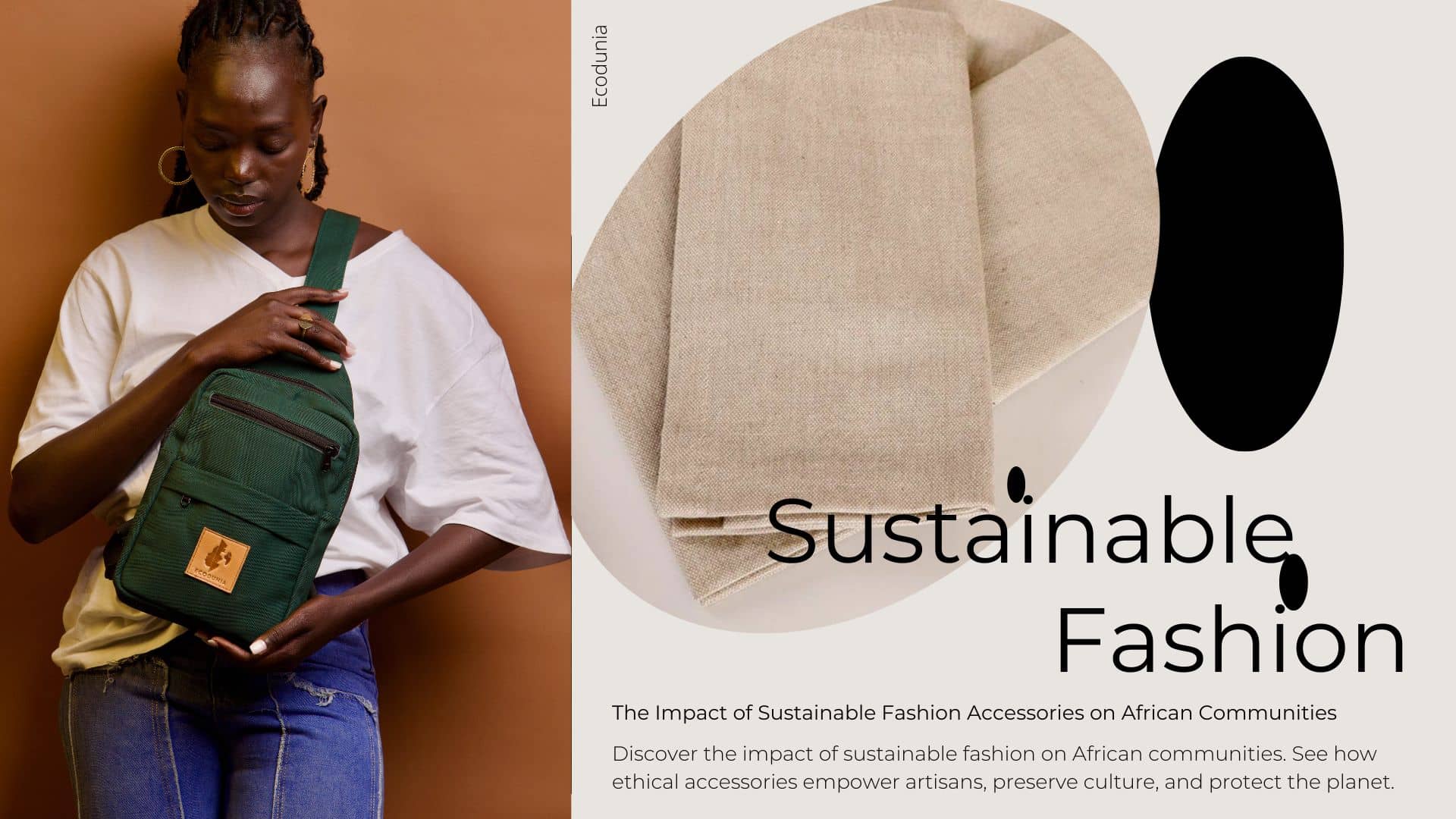The Impact of Sustainable Fashion Accessories on African Communities
Cera Muchiri
Fashion is more than just clothing and accessories; it’s a reflection of culture, values, and identity. In recent years, sustainable fashion has emerged as a global movement, challenging the harmful practices of fast fashion and promoting alternatives that are ethical, eco-friendly, and socially responsible. While many think of sustainable fashion in terms of organic fabrics or recycled textiles, accessories like bags, jewelry, and embroidered items play an equally important role.
For African communities, the impact of sustainable fashion goes far beyond style. It creates jobs, preserves traditions, empowers women, and helps protect the environment. This blog explores how sustainable fashion accessories are transforming lives and reshaping the future of African artisan communities.
What Is Sustainable Fashion & Why Does It Matter?
At its core, sustainable fashion is about rethinking how clothes and accessories are designed, produced, and consumed. Unlike fast fashion, which thrives on overproduction, exploitation, and waste, sustainable fashion emphasizes:
- Eco-friendly materials: Natural, recycled, or upcycled fabrics and metals.
- Fair trade practices: Ensuring artisans and workers receive fair wages.
- Cultural preservation: Honoring traditional craft techniques.
- Reduced waste: Designing durable products that last.
Accessories such as handmade bags, jewelry, and embroidered textiles are especially powerful within this movement because they combine artistry with function. They are small but meaningful items that tangibly showcase sustainability.
The Impact of Sustainable Fashion on African Communities
The impact of sustainable fashion on African communities is profound. It extends beyond economic benefits and influences culture, society, and the environment.
Economic Impact
- Job Creation: Handmade fashion accessories provide employment opportunities for artisans, many of whom might otherwise struggle to find work in rural or underserved areas.
- Fair Wages: Sustainable brands often pay above-market rates, ensuring artisans can support their families and invest in education.
- Entrepreneurship: Many artisans develop their own workshops or small businesses, creating ripple effects across their communities.
Social Impact
- Women’s Empowerment: In many African artisan groups, women make up the majority of the workforce. Jewelry making, embroidery, and textile work provide them with independence and leadership roles.
- Preserving Heritage: By keeping traditional embroidery, beadwork, or metalwork alive, sustainable fashion accessories celebrate and protect cultural identity.
- Community Development: Artisans reinvest earnings into schools, healthcare, and local projects, strengthening entire villages.
Environmental Impact
- Reduced Waste: Using recycled metals like brass or repurposed textiles helps cut down on landfill waste.
- Eco-conscious Materials: Vegan leather, organic cotton, and natural dyes reduce reliance on harmful chemicals.
- Sustainable Practices: By producing in smaller, intentional batches, artisans minimize overproduction and pollution.
Case Study: Handmade Accessories in Africa
Across Africa, artisans are blending tradition with innovation to create sustainable accessories.
- Handmade Jewelry: Many African jewelry makers use recycled and upcycled brass, transforming discarded materials into rings, bracelets, and earrings. Each piece is handmade, carrying a story of resilience.

- Sustainable Bags: From canvas totes to vegan leather crossbodies, handmade bags combine function with sustainability. Many designs feature hand embroidery inspired by birds, animals, and local patterns.

- Textiles: Embroidered tea towels and fabrics showcase cultural artistry while using Fair Trade cotton that supports eco-friendly farming.

These accessories not only appeal to global shoppers but also demonstrate how African artisans can compete in international markets while staying true to sustainable values.
Challenges African Artisans Face
Despite the growing popularity of sustainable fashion, African artisans face significant challenges:
- Competition with Fast Fashion: Mass-produced items are cheaper, making it harder for handmade goods to compete on price.
- Market Access: Many artisans lack the resources to market their products globally, limiting their reach.
- Funding and Training: Expanding operations requires education, technology, and investment that are often unavailable locally.
These challenges highlight the importance of partnerships with ethical brands that connect artisans to wider markets and provide the tools needed for growth.
How Brands Like Ecodunia Make a Difference
Ecodunia is one example of how sustainable fashion can directly empower African communities. By focusing on Fair Trade practices and sustainable materials, Ecodunia ensures that every purchase has a positive impact.
- Fair Wages: Artisans are paid fairly for their skills, often above industry standards.
- Supportive Workplaces: Team members receive three free meals a day, healthcare coverage, and retirement contributions through NSSF.
- Cultural Celebration: Products highlight African artistry, from embroidered crossbody bags to hand-forged brass jewelry.
- Global Reach: By connecting Kenyan artisans with international customers, Ecodunia helps bring African sustainable fashion to the world stage.
When customers buy from brands like Ecodunia, they are not only getting a beautiful product, they are investing in people, culture, and sustainability.

Why Consumers Should Care
It’s easy to dismiss shopping choices as small, but they add up. Every purchase is a vote for the kind of world we want to live in. When consumers choose sustainable fashion accessories:
- They support fair trade economies instead of exploitation.
- They reduce demand for harmful, wasteful fast fashion practices.
- They help preserve cultural artistry that might otherwise disappear.
- They empower communities to grow in a way that is both ethical and environmentally sound.
In other words, conscious shopping has global ripple effects.




